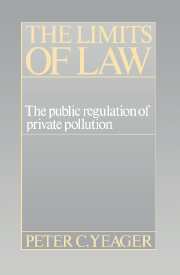Book contents
- Frontmatter
- Contents
- Preface
- Acknowledgments
- 1 The social production of business offenses
- 2 Bringing the law back in: an integrated approach
- 3 The politics of water: pollution policies to 1970
- 4 Contradiction and change: environmental consciousness and the mobilization of law
- 5 Legislating clean water: changing conceptions of environmental rights
- 6 Controls and constraints: from law to regulation
- 7 Enforcement: the social production of environmental offenses
- 8 Ecology, economy, and the evolution of limits
- Bibliography
- Index
5 - Legislating clean water: changing conceptions of environmental rights
Published online by Cambridge University Press: 23 May 2010
- Frontmatter
- Contents
- Preface
- Acknowledgments
- 1 The social production of business offenses
- 2 Bringing the law back in: an integrated approach
- 3 The politics of water: pollution policies to 1970
- 4 Contradiction and change: environmental consciousness and the mobilization of law
- 5 Legislating clean water: changing conceptions of environmental rights
- 6 Controls and constraints: from law to regulation
- 7 Enforcement: the social production of environmental offenses
- 8 Ecology, economy, and the evolution of limits
- Bibliography
- Index
Summary
The great question of the seventies is, shall we surrender our surroundings, or shall we make our peace with Nature and begin to make the reparations for the damage we have done to our air, our land, our water? … Clean air, clean water, open spaces – these would once again be the birthright of every American.
President Richard Nixon, 1970 State of the Union AddressWith this rhetorical flourish, a Republican president lent the voice of his office to the growing national chorus of the new environmental consciousness. His reference to a “birthright” suggested that the responsibilities of the present generation for the environmental well-being of future ones bore the stamp of natural law itself (cf., Borrelli, 1986). Given the climate of the times, this did not sound like hyperbole. The cause of environmental protection had come to articulate itself in terms of moral rights, for example by linking the principle of equality of opportunity to the right to a decent environment, without which opportunity is compromised (Schroeder, 1983: 16–17; also Bardach and Kagan, 1982: 13–14):
If human rights … are those rights which each human possesses in virtue of the fact that he is human and in virtue of the fact that those rights are essential in permitting him to live a human life (that is, … permitting him to fulfill his capacities as a rational and free being), then might not the right to a decent environment be properly categorized as such a human right? […]
- Type
- Chapter
- Information
- The Limits of LawThe Public Regulation of Private Pollution, pp. 130 - 175Publisher: Cambridge University PressPrint publication year: 1991



